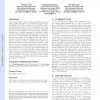Free Online Productivity Tools
i2Speak
i2Symbol
i2OCR
iTex2Img
iWeb2Print
iWeb2Shot
i2Type
iPdf2Split
iPdf2Merge
i2Bopomofo
i2Arabic
i2Style
i2Image
i2PDF
iLatex2Rtf
Sci2ools
108
click to vote
GECCO
2010
Springer
2010
Springer
Improved step size adaptation for the MO-CMA-ES
The multi-objective covariance matrix adaptation evolution strategy (MO-CMA-ES) is an evolutionary algorithm for continuous vector-valued optimization. It combines indicator-based selection based on the contributing hypervolume with the efficient strategy parameter adaptation of the elitist covariance matrix adaptation evolution strategy (CMA-ES). Step sizes (i.e., mutation strengths) are adapted on individual-level using an improved implementation of the 1/5-th success rule. In the original MO-CMA-ES, a mutation is regarded as successful if the offspring ranks better than its parent in the elitist, rank-based selection procedure. In contrast, we propose to regard a mutation as successful if the offspring is selected into the next parental population. This criterion is easier to implement and reduces the computational complexity of the MO-CMA-ES, in particular of its steady-state variant. The new step size adaptation improves the performance of the MO-CMA-ES as shown empirically usi...
Adaptation Evolution Strategy | Covariance Matrix Adaptation | GECCO 2010 | Matrix Adaptation Evolution | Optimization |
Related Content
| Added | 12 Aug 2010 |
| Updated | 12 Aug 2010 |
| Type | Conference |
| Year | 2010 |
| Where | GECCO |
| Authors | Thomas Voß, Nikolaus Hansen, Christian Igel |
Comments (0)

